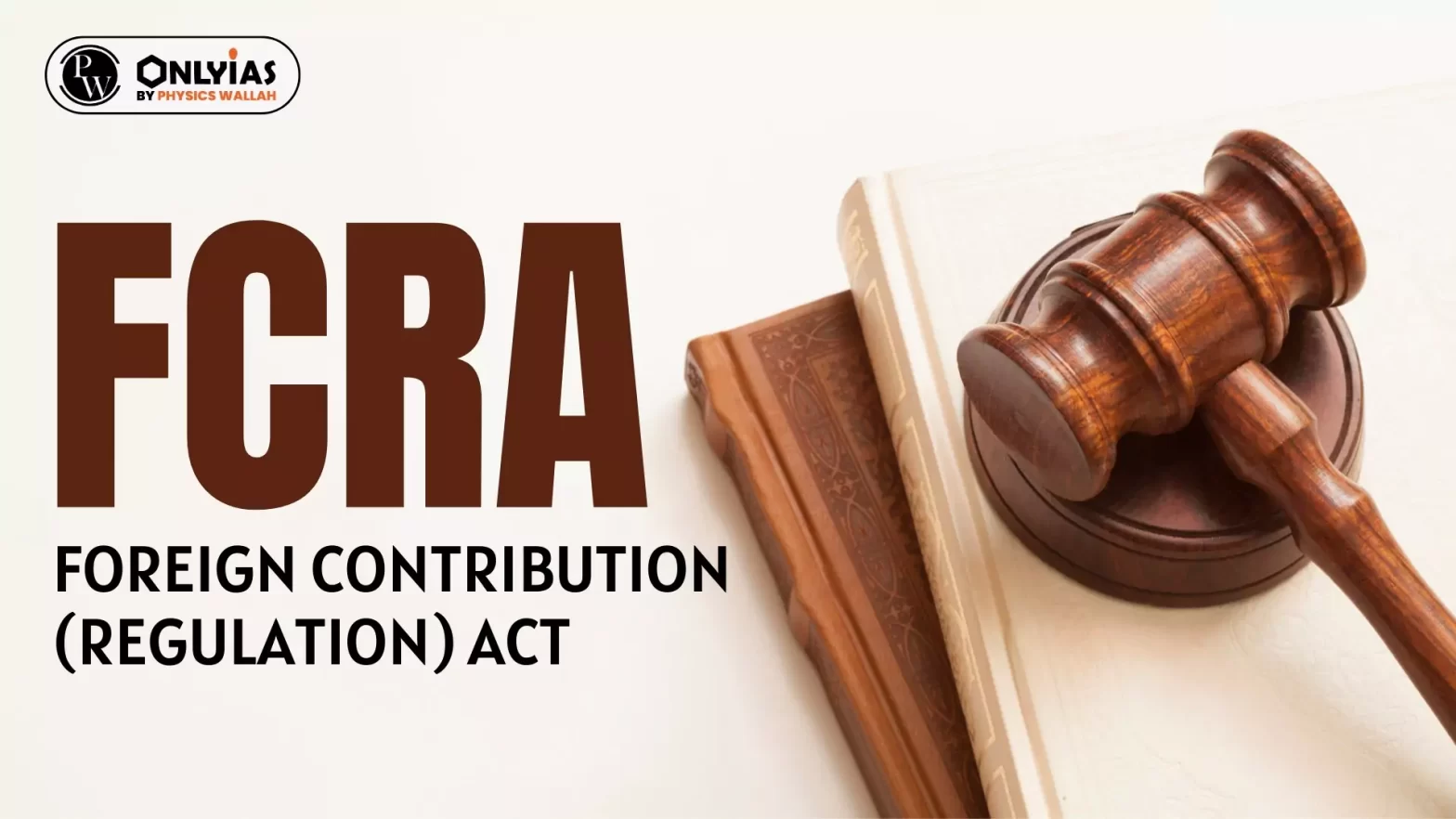Context:
This article is based on the news “Democratic backsliding: On the state wielding the FCRA as a weapon” which was published in the Hindu. Recently, the Government of India has cancelled the Foreign Contribution (Regulation) Act (FCRA) license of the Centre for Policy Research (CPR).
| Relevancy for Prelim: Centre for Policy Research (CPR), FCRA Registration, Foreign Contribution (Regulation) (Amendment) Rules, 2022, Enforcement Directorate (ED),
Relevancy for Mains: FCRA Act: Its Amendments, Need, Significance, Concerns, and Way Forward. |
Home Ministry Cancels FCRA Registration of CPR
- Reason for Cancellation of License: The current affairs programming by CPR, is prohibited for an entity using FCRA funds.
- CPR Suspension: In 2023, the government suspended the FCRA license of the CPR over violation of the FCRA act:
- It was using foreign contributions for purposes other than that for which it is registered and for undesirable purposes.
- Transferred foreign contributions to other entities in violation of the Act.
- It was publishing news articles in violation of the Act.
Centre for Policy Research (CPR)
- CPR: It is a non-profit, non-partisan, independent institution dedicated to researching the issues that impact life in India.
- It is a member of the Indian Council of Social Science Research and is recognised by the Department of Science and Technology.
- Foundation: In 1973.
- Foreign Funding: The CPR used to raise more than 75% of its funds from outside India.
- Its funders have included the Bill and Melinda Gates Foundation, the Ford Foundation, etc.
|
About FCRA
- Foreign Contribution (Regulation) Act: It regulates and prohibits the acceptance and utilisation of foreign contributions by certain associations for any activities detrimental to the national interest.
- The Act also prohibits the receipt of foreign funds by candidates for elections, journalists or newspaper and media broadcast companies, judges and government servants, members of the legislature and political parties or their office-bearers, and organisations of a political nature.
- Origin: The FCRA was enacted during the Emergency in 1976 amid apprehensions that foreign powers were interfering in India’s affairs by pumping money into the country through independent organisations.
- Duration of Approval Granted: FCRA registration is valid for five years.
- NGOs are expected to apply for renewal within six months of the registration expiry date. In case of failure to apply for renewal, the registration is deemed to have expired.
Amendments to the FCRA
- FCRA Amendment 2010: Enacted to consolidate the law on utilising foreign funds, and to prohibit their use for any activities detrimental to national interest.
- FCRA Amendment 2020: The law was amended again, giving the government tighter control and scrutiny over NGOs’ receipt and utilisation of foreign funds.
- Foreign Contribution (Regulation) (Amendment) Rules, 2022: In July 2022, the Ministry of Home Affairs (MHA) changed FCRA rules, increasing the number of compoundable offenses under the Act from 7 to 12.
- The other key changes were:
- Exemption from intimation to the government for contributions less than Rs 10 lakh, the earlier limit was Rs 1 lakh.
- Increase the time limit for the intimation of the opening of bank accounts.
Foreign Contribution (Regulation) Amendment Act, 2020
- Prohibition to Accept Foreign Contribution: The act adds public servants to the list of parties prohibited to accept any foreign contribution.
- Transfer of foreign contribution: The act prohibits the transfer of foreign contribution to any other individual, association, or a registered company.
- Aadhaar for Registration: Any person seeking prior permission, registration or renewal of registration must provide the Aadhaar number.
- In case of a foreigner, they must provide a copy of the passport or the Overseas Citizen of India card for identification.
- FCRA Account: Foreign contribution must be received only in an account designated by the bank as “FCRA account” in such a branch of the State Bank of India, New Delhi, as notified by the central government.
- No funds other than the foreign contribution should be received or deposited in this account.
- Restriction in Utilisation of Foreign Contribution: The government may restrict usage of unutilised foreign contribution for persons who have been granted prior permission to receive such contribution.
- Reduction in use of foreign contributions for administrative purposes: Organisations must not use more than 20% of the contribution for meeting administrative expenses.
- Suspension of registration: The government may suspend the registration and such suspension may be extended up to an additional 180 days.
|
Need of FCRA
- National Interest and Security: The law sought to regulate foreign donations to individuals and associations so that they functioned consistently with the values of a sovereign democratic republic.
- In 2014, a leaked report from India’s Intelligence Bureau accused NGOs such as Greenpeace, Cordaid, Amnesty, and Action Aid of reducing India’s GDP by 2-3 per cent per year.
- In 2015, the Ford Foundation was put under the prior approval category and put on the Home Ministry’s watch list for some time in the interest of national security.
- Regulation of Foreign Funding: The FCRA provides a legal framework for regulating foreign contributions to ensure transparency and accountability in utilising such funds.
- FCRA promotes accountability and transparency in receiving and utilising foreign contributions as organisations must maintain detailed records, submit annual reports, and undergo audits to ensure compliance.
- Preventing Money Laundering and Unlawful Activities: The FCRA helps prevent using foreign funds for prohibited or unlawful activities under Indian law.
- This includes activities that might disrupt public order, promote communal or caste tensions, or undermine the democratic fabric of the country.
- For instance, the Enforcement Directorate (ED) froze the bank accounts of NGO Amnesty International (AI) India over alleged charges of money laundering in 2020.
- Ensuring Legitimate Purposes: The act is designed to ensure that foreign contributions are used for legitimate purposes such as social, educational, cultural, and economic activities that benefit the people of India. It establishes mechanisms to verify the authenticity of the organizations receiving foreign funds.
- In 2016, the Ministry of Home Affairs (MHA) cancelled the FCRA licence of the NGO Lawyers’ Collective for allegedly using foreign contributions for political purposes.
- NGO Sabrang Trust had its FCRA registration cancelled allegedly mixing foreign and domestic funds, and for spending funds on publishing the Communalism Combat magazine.
Concerns Associated with FCRA
- Lack of Compatibility with International Law: The International Commission of Jurists (ICJ) condemned the adoption of the Indian Foreign Contribution (Regulation) Amendment Act 2020 (FCRA 2020).
- According to ICJ, the legislation fails to comply with India’s international legal obligations and constitutional provisions to respect and protect the rights to freedom of association, expression, and freedom of assembly.
- Erosion of Civil Liberties: According to various former bureaucrats, every expression of difference of opinion or dissent cannot be interpreted as violating the integrity and sovereignty of the country or as being against the public interest.
- For instance, the suspension of Commonwealth Human Rights Initiative (CHRI) and Oxfam India give rise to suspicion that independent assessments of socio-economic indicators of the country are not welcome.
- Alleged for Targeting of NGOs: Over the past seven years, the government has cancelled the registration of more than 16,700 NGOs and thus, government is facing allegations of targeting NGOs.
- Stringent Regulations: The FCRA imposes complex and stringent regulations on NGOs receiving foreign funding with the process of registration and obtaining prior permission under the act can be time-consuming.
- For instance, NGO’s alleged that the SBI was not operationalising the FCRA accounts in time, leading to delay in receipt of foreign contributions.
- Potential of Misuse: The state can utilize FCRA as a tool to suppress organizations whose activities diverge from its goals, especially those focused on environmental concerns, civil liberties, and human rights.
- For instance, the FCRA licence of the NGO Legal Initiative for Forest and Environment (LIFE) was suspended for misuse of funds to litigate against Indian coal projects.
- Ambiguity and Subjective Interpretation: Some NGOs have expressed concerns about the vague and subjective language of certain FCRA provisions, allowing for arbitrary interpretation and discretion by authorities.
- For instance, the government can cancel the FCRA license if, in the opinion of the Central Government, it is necessary in the public interest to cancel it. Here, opinion of the government and public interest can carry multiple interpretations.
On What Basis is Approval Cancelled?
- Registration can be cancelled if an inquiry finds:
- A false statement in the application.
- NGO is found to have violated any of the terms and conditions of the certificate or renewal.
- If it has not been engaged in any reasonable activity in its chosen field for the benefit of society for two consecutive years.
- If it has become defunct.
- Other reasons for cancellation:
- If in the opinion of the Central Government, it is necessary in the public interest to cancel the certificate.
- When an audit finds irregularities in the finances of an NGO in terms of misutilisation of foreign funds.
- Remedy: All government orders can be challenged in the High Court.
Way Forward to the FCRA Registration and Suspension
- Ensuring Transparency in Granting and Suspension of FCRA: It is crucial for accountability, preventing misuse, and maintaining trust. Transparent processes uphold democratic values and protect organizational integrity.
- Streamlining FCRA Processes: Obtaining approval of FCRA license is a hectic task and despite obtaining approval from the Ministry of Home Affairs (MHA), issues of unnecessary procedural delays have been reported by NGOs.
- For this, the Delhi High Court has mandated the State Bank of India (SBI) to promptly open FCRA accounts for NGOs within 10 days of receiving approval from the Centre.
- Engaging with Authorities: Establish open communication channels with relevant government bodies to comprehend the specific concerns leading to FCRA license cancellations. Constructive dialogue may present opportunities for resolution and clarification.
- Diversifying Funding Channels: NGOs should lessen reliance on foreign funds by seeking financial support from local philanthropic organizations, private donors, or collaborating with government initiatives within India.
- Promoting Credible NGOs: With the rising cancellation of FCRA license, there is a rising air of mistrust around NGOs which will hurt civil societies which are commited and caring.
- Thus, recognising, promoting and even awarding such hard working NGOs can play important role in ensuring their credibility in long term.
- For instance, organizations like Teach For India address the critical issues in sectors like education, healthcare, and human rights.
- Further, NGOs contribute significantly to employment, engaging approximately 72 lakh individuals in India.
To get PDF version, Please click on "Print PDF" button.

